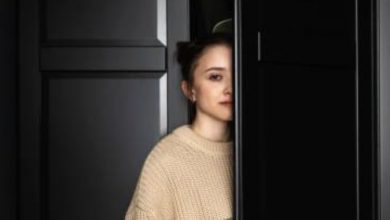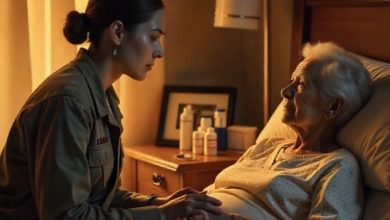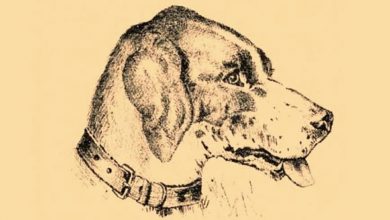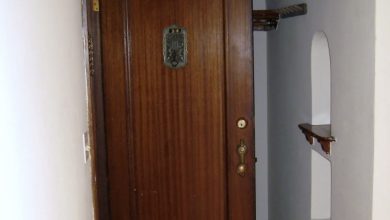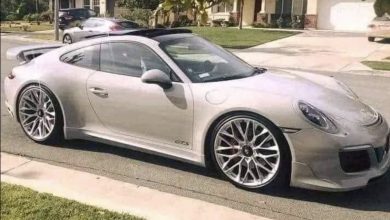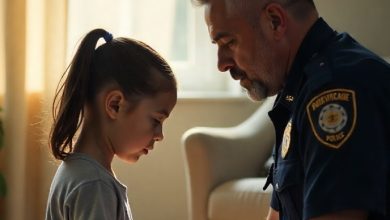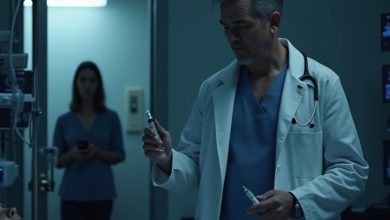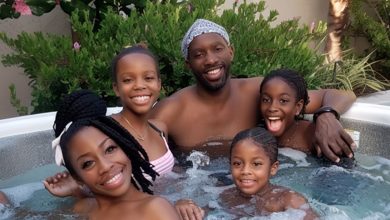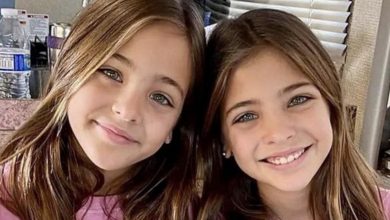How a Stranger Biker Changed Everything I Thought I Knew About My Past
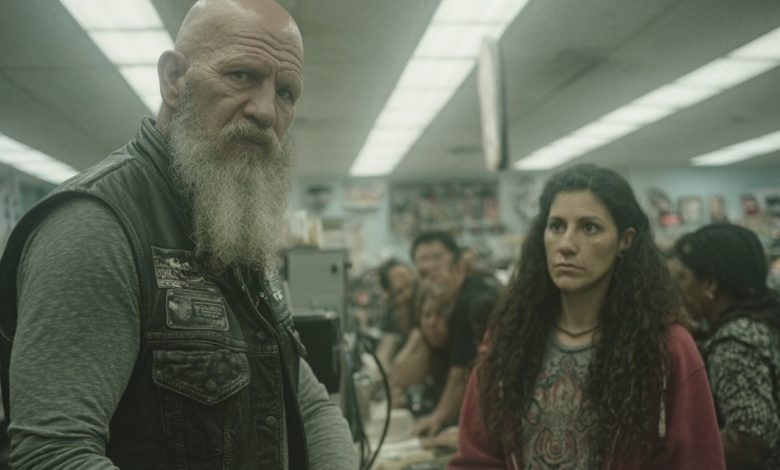
I was standing in line at the grocery store, watching an old biker carefully counting his crumpled dollar bills at the checkout. I couldn’t help myself. I laughed loudly enough for the people behind me to hear. “Maybe if you didn’t waste your money on motorcycles, you wouldn’t have to count pennies just to buy food,” I said. Some people chuckled. I felt clever.
The old man stopped counting and looked at me. I expected anger or embarrassment.
But instead, his eyes held something that made my smile vanish—recognition. Like he knew exactly who I was, even though I had never met him.
“Ma’am,” he said quietly, his voice rough but steady, “I have $47.83 here. My groceries cost $51.20. If you don’t like how long I’m taking, I can put some things back.”
I rolled my eyes, feeling proud with the other shoppers around me. “Of course, you will. Typical biker trash, probably wasting welfare money on bikes.”
Before I could finish, he interrupted me. “Sarah Kempley,” he said slowly. My blood froze. No one had called me by my old last name in fifteen years. “Daughter of Richard Kempley. Born February 12th, 1987, at Riverside General.”
The store seemed to tilt. How did he know these details? My hand moved toward my purse, ready to grab my phone. People around us stopped laughing, sensing the change in the air.
The biker carefully pulled a worn photo from his wallet. His hand shook a little as he placed it on the belt between us. “I’ve carried this picture for thirty-six years. I hoped I’d never have to use it. But here we are.”
I looked down at the photo, and the world slipped away. It was a hospital room. A tired but smiling young woman lay in bed holding a baby. Standing next to her, holding her hand, was a younger version of this biker.
But it wasn’t the man that made me grab the counter for support.
It was the woman.
It was my mother.
My mother died when I was two. She had no family, no one to care for me.
And this biker—the man I had just mocked—was holding her hand like she was everything to him.
Was he my father?
My name is Sarah Mitchell, and I want to tell you about the day I found out my whole life story was a lie—and how the man I tried to humiliate turned out to be the father I never knew.
The grocery store was silent except for the soft beeping of machines and humming freezers. Everyone stared at me—white-faced and shaking—and at the biker, whose eyes held thirty-six years of pain.
“I don’t understand,” I whispered, still staring at the photo. “My father said my mother had no family. Said it was just us after she died.”
The biker—who I still thought of as a stranger—laughed bitterly. “Richard Kempley said a lot of things. Mostly to keep you from knowing about me.”
The checkout clerk, a young woman with wide eyes, cleared her throat. “Should I call security?”
“No,” I said quickly. “I… Can we talk? Somewhere else?”
He nodded, picking up his groceries—the ones he could pay for. I watched as he left behind some chicken, vegetables, and bread. Basic food he gave up because he was short a few dollars.
“Wait,” I said, my voice shaking. “Ring those up too. I’ll pay for everything.”
He stiffened. “I don’t need your charity.”
“It’s not charity,” I said, feeling foolish. “Please. Just let me pay for your groceries. Then we can talk.”
Driving behind his old Harley to the nearby coffee shop, I tried to connect the man I had just met to the father I never knew.
Inside the nearly empty café, we sat across from each other like strangers. Up close, I noticed things I hadn’t before—the bump on his nose like mine, the shape of his eyes despite the difference in color. Small signs this wasn’t a trick.
“Your mother’s name was Linda Marie Hoffman before she married me,” he said softly. “We met after I came back from Vietnam. I was a mess—PTSD, though they didn’t call it that then. She worked at the VA hospital.”
He pulled out more photos—treasured memories. My mother, young and happy, sitting on the back of a motorcycle. Their wedding, him in uniform, her in a simple white dress. My mother pregnant, laughing.
“We were happy,” he said. “When you were born, I thought I was free from the darkness of war. Had a reason to stay clean.” He gripped his coffee cup. “Then Linda got sick. Cancer. Fast and brutal.”
I knew this part. My father, Richard—the man who raised me—had told me my mother died of cancer when I was two. What he never said was that she was married to someone else.
“Richard was her doctor,” the biker said, voice heavy. “Young, rich, everything I wasn’t.” He paused. “Linda was scared. Richard promised he could give you a better life than a biker fresh from ‘Nam.”
“But you were my father,” I whispered.
“She was dying,” he said firmly. “Richard convinced her—and me—that it was best for you. Said I could visit if he got legal guardianship.”
I saw the pain in his face.
“The day after she died, Richard got a restraining order. Said I was dangerous. Witnesses lied. The judge never asked questions. Suddenly, I wasn’t allowed near my own daughter.”
“I fought,” he said, “but with my past, my PTSD, I had no chance. Richard changed your birth certificate. Acted like I never existed.”
My hands shook. Everything I knew was breaking.
“Why didn’t you try harder?” I asked. “Why didn’t you fight more?”
“I wrote letters,” he said quietly. “Every birthday, every Christmas. Richard sent them back. But I kept them.” He pulled out a thick envelope. “Thirty-six years of letters to a daughter I couldn’t know.”
I took the envelope with trembling hands. It was worn soft, heavy with years of love never sent.
“I never stopped looking for you,” he said. “When you turned 18, I hired a detective. Found out Richard moved you far away and changed your name. You were in college. I thought of reaching out, but—look at me. What would you think?”
He was right. I would have called the cops. Just like I tried to humiliate him at the store for being different.
“I watched from afar,” he said. “Saw your wedding, your kids, your success. I was proud. Like your mother would be.”
“Why here?” I asked.
“My bike broke down near here. I fixed it at Henderson’s Garage. Didn’t expect to see you.”
The weight of my actions hit me. This man—my father—had lived with pain and respect for boundaries for decades. And I had treated him cruelly.
“The groceries,” I said. “You saved money on parts to buy food.”
He smiled. “Parts can wait. A man’s gotta eat.”
“What’s your name?” I asked.
“Daniel. Your mother called me Danny.”
“Danny,” I repeated softly. “I’m sorry. For everything.”
“You don’t owe me anything,” he said. “I’m glad to see you. That’s enough.”
We talked for hours. He told me about my mother—her laughter, her dance, the nursery they painted for me, the motorcycle they planned to fix together.
He spoke of his life after—odd jobs, sleeping rough, staying sober.
“I never stopped loving you,” he said.
“Someday,” I whispered.
“Someday is now,” he smiled.
Two years later, my kids call him Grandpa Danny. He runs a small garage teaching kids skills. My coworkers whispered at first, but now respect him.
I drive past that store and remember the woman I was. I’m thankful for that day—it brought me my father.
Danny says everything happens for a reason. I’m just glad fate gave us a second chance.
And when I hear a motorcycle’s roar, I hear my father’s heartbeat—steady and strong.

